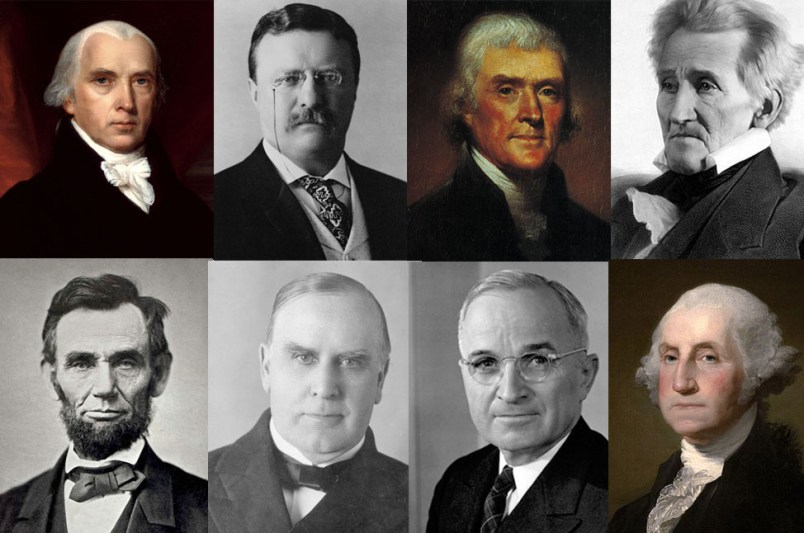CSPAN has its latest historians’ ratings of American Presidents out. There are some interesting conclusions.
As in the last three quadrennial surveys, the top three are Lincoln, Washington and Roosevelt. I think that’s a pretty accurate ranking. Reagan and Obama are 9th and 10th. Other recent Presidents are much further back: Clinton (19th), H.W. Bush (21), Carter (26), Ford (28) W Bush (29).
With one exception: Donald Trump. He’s listed 41st out of the 44 American Presidents. This is hardly surprising in itself given his cataclysmic presidency. What was interesting to me is who he is classed with. James Buchanan is last. That’s not surprising and it’s a good choice. Buchanan was the President who sat and did nothing, perhaps even connived with the South, as the country slid into Civil War. The two others Pierce (42) and Andrew Johnson (43) bookend the calamity of the Civil War. Pierce precedes Buchanan and was yet another Northerner with Southern sympathies, a general non-entity in an era of weak Presidents who dithered as the country fell apart. Johnson is the accidental President who goes to war with congressional Republicans over Reconstruction. All three who share a place with Trump bookend the calamity of the Civil War.
The movements are also interesting. Ulysses Grant has moved from 33 in 2000 to 20th today. That’s a move in the right direction but not far enough. In 2000 and 2009 Andrew Jackson was 13th. Now he’s fallen to 22nd. This is clearly driven by changing attitudes about Jackson’s role as a slaveholder and President during the Trail of Tears. Not changing attitudes precisely but changing attitudes about how central these facts are to the evaluation of his presidency.
I think to a certain extent too the downgrading of his reputation is due to the fact that self-styled nationalist intellectuals have increasingly cast him as a progenitor of contemporary American populism and aggressive, unilateral US foreign policy. Much of this comes from Walter Russell Mead, a conservativish columnist and academic. This was eventually taken up by Donald Trump himself, through Steve Bannon. To capture this identification Trump placed a painting of Jackson in the Oval Office during his tenure.
This Trumpian version of Jackson is poor history. I’m not so much saying the direct comparison with Trump, which not that many out of Trump’s circle make, but the broader identification with populism and bellicose foreign policy. In any case, the early 21st century hasn’t been kind to Jackson’s reputation.
Another tumbler is Woodrow Wilson. 6th in 1997, down to 13th today. To my mind this is a much more justified demotion. Wilson too has suffered by the rising appreciation of the role of slavery, racism and institutional racism in the American past. But here it’s a bit different than with Jackson. Wilson simply had great press, historical press. For decades he was seen as a progenitor of the presidency of Franklin Roosevelt, an early zenith of Progressive reform. Indeed, his name was literally identified with the idealist current in American foreign policy thought.
But of course Wilson was an ardent segregationist. We must always judge people in part by the standards of their times. But even by the standards of his own time he was an ardent segregationist. He re-segregated the federal workforce. Wilson was from Virginia, the first Southerner elected President since the Civil War and only the second Democrat. But he left Virginia and began his political career in New Jersey, after serving as President of Princeton University. In other words, though Wilson was a Southerner he lived most of his adult life in the North and began his political career in a Northern state. If he had wanted to shaken off the political necessities of political life in the Jim Crow South he could have. But he didn’t. It was a matter of deep belief.
Historians have likely also placed more emphasis on the fact that his major foreign policy program – managing the post-World War I peace was in many respects a colossal failure.
The one other ranking that jumps out to me is Theodore Roosevelt who has come in fourth in all four rankings back to 2000. I think TR is an admirable President. He’s there for a mix of his reformism and the fact the he basically introduces the US as an aspirant global power. So yay! TR. But the fourth best president? And consistently the fourth over two decades. That just strikes me as odd. It doesn’t really quite add up.
Here’s the full list.






